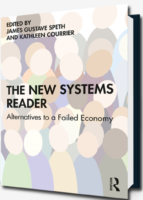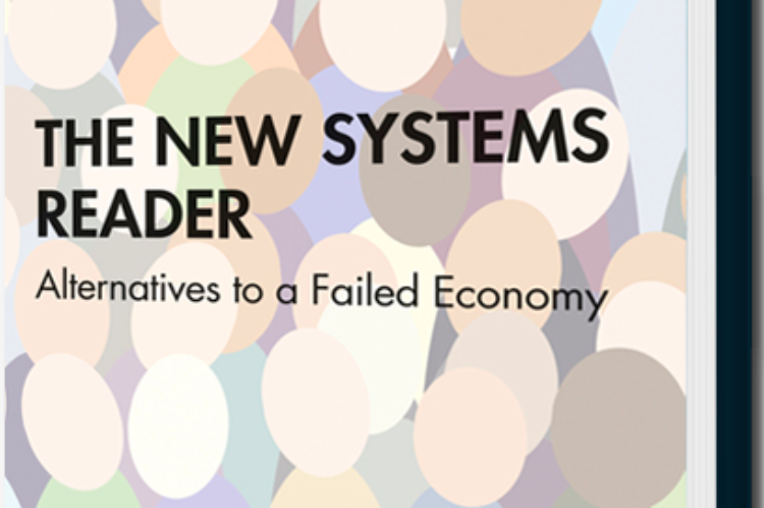As befits our time of converging existential crises, a number of new anthologies of essays are popping up to make sense of how modern industrial society got here and to propose coherent strategies for moving forward. Today I’d like to call attention to a fantastic collection of 29 original essays, The New Systems Reader: Alternatives to a Failed Economy, edited by James Gustave Speth and Kathleen Courrier and published by Routledge.
 This 480-page book is a cornucopia of fresh, original thinking by leading thinkers and activists such as Gar Alperovitz, Tim Jackson, Michael Shuman, Ed Whitfield, Riane Eisler, David Korten, Richard D. Wolff, Kali Akuno, Aaron Tanaka, and J.K. Gibson-Graham.
This 480-page book is a cornucopia of fresh, original thinking by leading thinkers and activists such as Gar Alperovitz, Tim Jackson, Michael Shuman, Ed Whitfield, Riane Eisler, David Korten, Richard D. Wolff, Kali Akuno, Aaron Tanaka, and J.K. Gibson-Graham.
Chapters cover a wide gamut of topics: social democracy and radical localism, the elements of a new, green economy, worker democracy, the Solidarity economy, cooperatives, participatory economics, reparative economics, and much more. (I have my own chapter on commoning as a transformative social paradigm.)
The Next System Project is an initiative of the Democracy Collaborative, which has long been showcasing the best research and strategic thinking about “visions, models and pathways that point to a ‘next system’ radically different in fundamental ways from the failed systems of the past and present….” So it’s a pleasure to have so many diverse voices consolidated into a single volume.
“The starting point for this book,” writes the editors Speth and Courrier, “is the inability of traditional politics and policies to address fundamental challenges.” That’s why reading this book is so bracing – it squarely addresses the deep structural, political, economic, and cultural issues that must change.
In sifting through the diverse perspectives of contributors, the editors identify a number of shared premises, which I paraphrase here:
- a shift of ownership and control to workers and the public
- the imperative to protect the planet and its climate
- democratically determined priorities in investment
- the abandonment of growth and GDP as the focus of national well-being
- equal justice and reparative justice to address systemic racism, and
- greater popular sovereignty and economic democracy
For those who may wish to study these essays with a reading group or class, there is a useful 24-page study guide that accompanies The New Systems Reader. It’s by Thad Williamson, for the Democracy Collaborative, and a free PDF of the guide can be downloaded here.
In a previous post, I noted my own offering in the small but growing oeuvre of system-change anthologies and treatises. Check out The Great Awakening: New Modes of Life Amidst Capitalist Ruins, co-edited with Anna Grear, available under a Creative Commons license and available in print or free downloads.
In my next blog, another excellent anthology dealing with system-change strategies.






